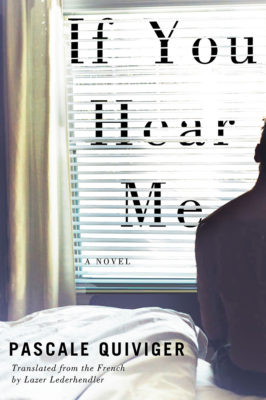After months of stasis and waiting, the protagonist of If You Hear Me muses, “Everything still happens in the present tense.” The stark uncertainty of her situation – her husband has spent months in a coma, hovering somewhere between life and death – has made imagining a future impossible, while the happiness of their previous normal life becomes harder and harder to remember. Writing this review during widespread stay-at-home protocols due to COVID-19 lends an uncanny echo to this observation. Months ago, I would have felt distanced from a plot driven by waiting, not action. Now, there is a familiarity that is both chilling and comforting in the story of a family suddenly put on indefinite pause.
Pascale Quiviger crafts a subtle and nuanced portrait of how the impact of a tragedy ripples outward. On an otherwise unremarkable June day, David Novak is severely injured in an accident at the construction site where he works. He lies in a coma for months afterwards, as his wife, son, and parents struggle to understand to what extent life goes on, and to what extent they are also now immobilized. Quiviger includes David’s internal monologue throughout the novel, creating parallel tracks of frustration. His wife, Caroline, has to repeatedly contend with confusion about whether her husband can hear, feel, or respond to anything happening around him. David, meanwhile, is desperate for anyone to hear the thoughts he cannot voice.

If You Hear Me
Pascale Quiviger
Translated by Lazer Lederhendler
Biblioasis
$22.95
paper
396pp
9781771962711
While the narrative is initially split quite equally between David and Caroline, it becomes more firmly her story as the months unfold. The change of seasons, the passing of holidays, and the growth of a child all subtly reinforce that this is a story about life finding a way. The family ecosystem expands outwards as the prolongation of David’s coma draws various hospital staff into an uneasy, sometimes tense, and sometimes nurturing community. Quiviger captures the rhythms of the medical establishment and displays impeccable research into the details of what David’s condition entails. What remains most powerful, though, is the charting of what happens when an individual walks a path that no one would voluntarily choose. Caroline reflects that, “Ultimately, without saying a single word, David will have been her best teacher. She knows she will spend the rest of her life searching in others for an intangible magnitude, an insoluble mystery. She thanks him for leading her there, so close to a new kind of truth.”
Sometimes, you read a novel at a moment when it says things you need to hear. Despite the plaintive note of the title, echoing David’s inability to communicate with those he loves most, this novel says things about loss, fragility, and acceptance at a moment when we all might be able to hear them more clearly than we could have before. Quiviger is gentle and yet insistent in her reminder: “The present, they say, is the key to happiness. Though you still need to find the lock.” mRb






0 Comments